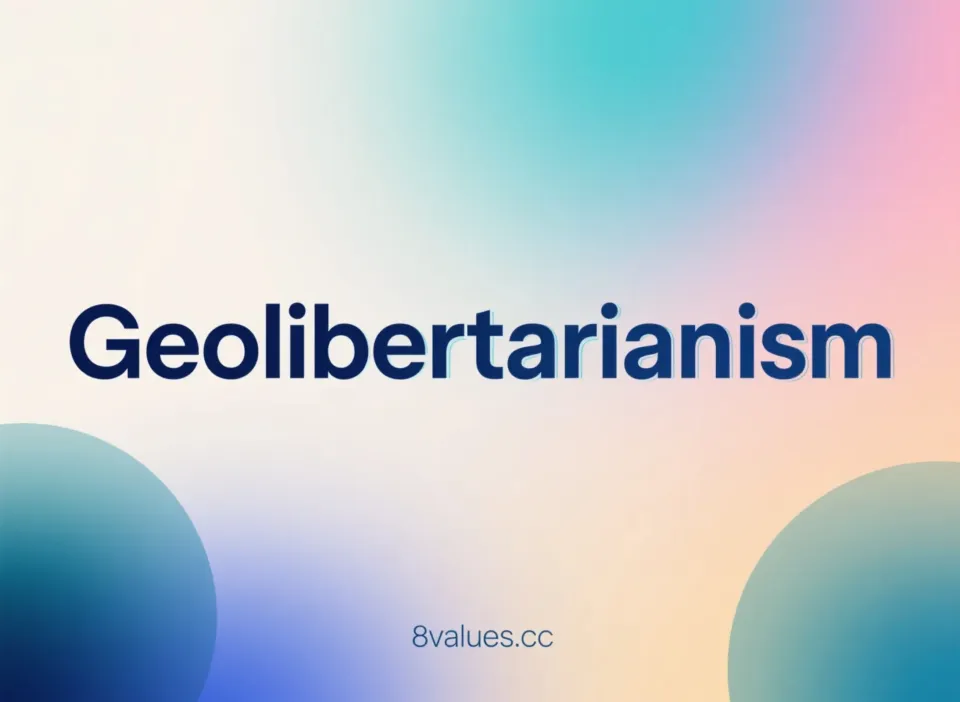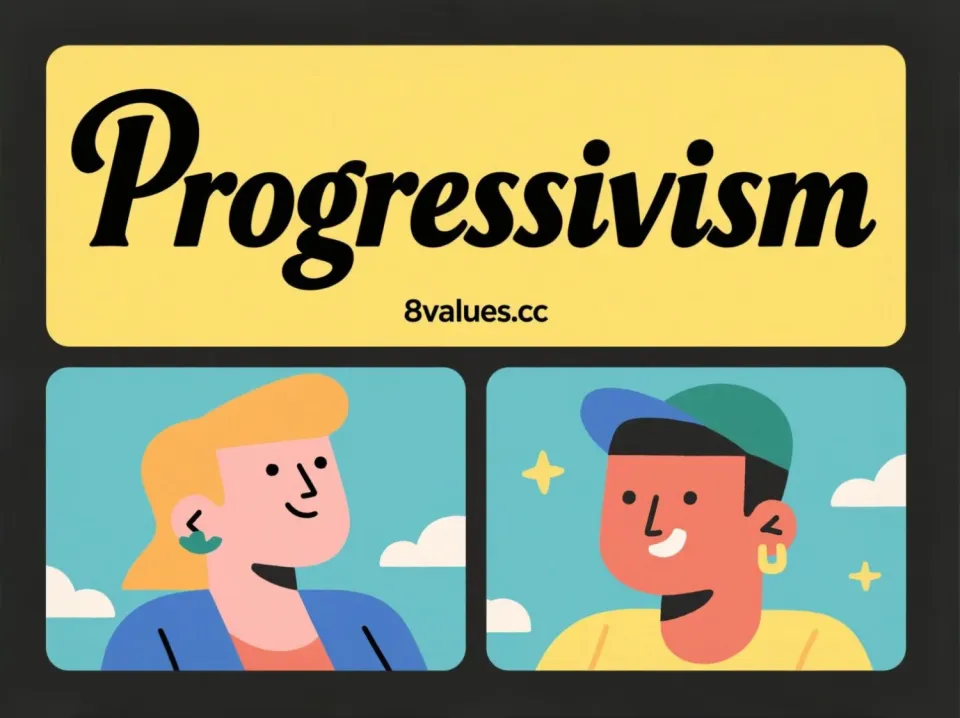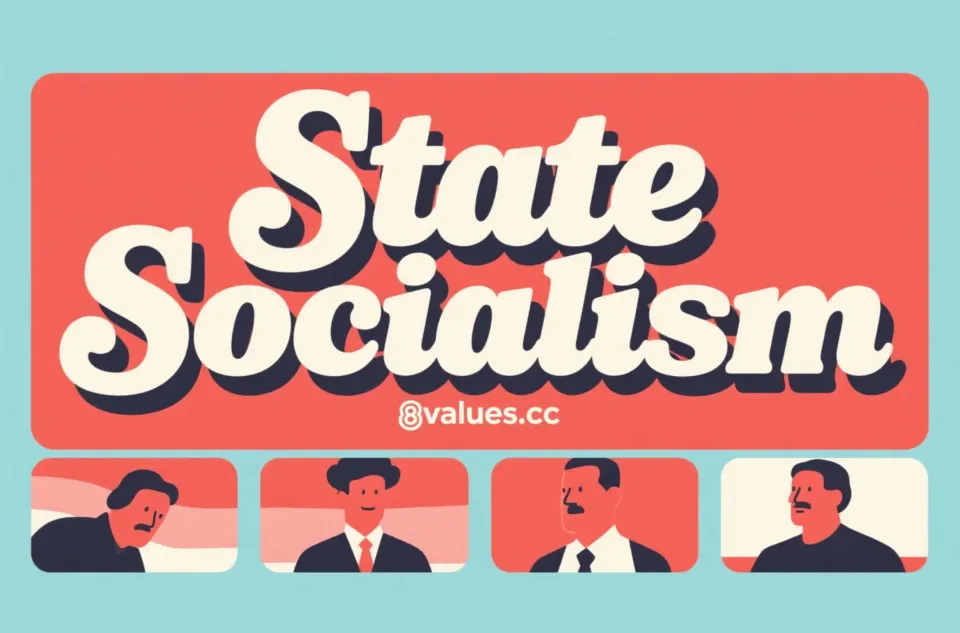An in-depth analysis of geolibertarianism
Geolibertarianism is a political and economic philosophy that combines Libertarianism and Georgism. It advocates that individual labor income should be fully privately owned, and the value (rent) generated by land and natural resources should be socially shared through land value tax (LVT), thereby balancing economic efficiency and fairness in resource distribution.
Geolibertarianism is a distinct political and economic ideology that combines Libertarianism's insistence on minimal government and individual rights with Georgism's theories of land ownership and rent . This kind of thinking attempts to solve the social injustice caused by the monopoly of land and natural resources while maintaining the principles of thorough free market.
Geo-libertarians believe that land and natural resources are the common heritage of mankind and their value should benefit all members of society. For those readers who are curious about their own political values and tendencies, they can learn how their positions fit with this genre by completing tests such as the 8 Values political orientation test and the 9 Axes political ideology test .
The Convergence of Ideologies: The Intersection of Libertarianism and Georgism
Geolibertarianism is also known as "geo-anarchism" (natural resources are the common heritage of mankind, and their value should benefit all members of society. For those readers who are curious about their own political value tendencies, they can use the various political ideology tests provided by the 8Values Quiz official website to understand how well their positions fit with this school.
The Convergence of Ideologies: The Intersection of Libertarianism and Georgism
Geolibertarianism is also known as "geoanarchism", "green libertarianism" or "ecolibertarianism". The term was first coined by economist Fred Foldvary in a 1981 article in Land and Liberty magazine.
foundations of libertarianism
Geolibertarianism inherits the core ethical claim of libertarianism: individuals have complete ownership of themselves . This means that everyone has exclusive private property rights over his or her body, the fruits of labor, and the material wealth (capital) created through labor. Therefore, governments should not deprive individuals of these gains by taxing labor, wages, production results, or capital. Geo-libertarians support full civil liberties and believe that there should be no criminalization unless there is a victim who was violated. They also support free markets, free trade, and oppose any form of state monopoly privileges.
Georgian view of land
Another theoretical foundation of geo-libertarianism is Georgism, an economic philosophy proposed by the 19th-century American economist Henry George in his book Progress and Poverty. George observes that despite economic and technological progress, poverty and inequality are deepening, which he attributes to rising land values flowing disproportionately to landowners.
The core idea of Georgianism is that land and natural resources are not the product of human labor . The value of land derives primarily from its natural endowments and the presence of communities and the public services they provide (e.g. infrastructure, population density). Therefore, this unearned value (i.e. rent) should be attributed to the community or all members of society.
Geo-libertarianism reconciles these two seemingly opposing philosophies. While traditional libertarianism (such as right-wing libertarianism) advocates absolute ownership of all property, including land, geo-libertarianism holds that the special nature of land makes such absolute privatization morally and economically unjustifiable.
Core Principles: Commonality of Land and Private Rights of Labor
The core ethics of geo-libertarianism lies in the unity of individuals’ exclusive rights to their own labor and individuals’ equal rights to land resources .
unique nature of land
In the definition of economics, "land" refers to any naturally occurring space and resources that can be used for production. This includes the ground, undersea, surface, airspace, orbit and the electromagnetic spectrum. Land, unlike labor and capital, is fixed and inelastic in its supply within given boundaries. Geo-libertarians emphasize that land cannot be created, moved, or destroyed.
Philosopher Thomas Paine summed up the idea brilliantly in his 1797 pamphlet Agrarian Justice, widely cited by geo-libertarians:
"Man did not create the earth. Only the value of the improvements, not the earth itself, is personal property. Every owner shall pay rent to the community for the land he holds."
Geo-libertarianism supports exclusive possession or usufruct of land, but only if the land generates economic rent , fair compensation must be paid to the community.
An extension of Lockean restrictions
Geo-libertarianism offers a modern interpretation of John Locke’s Lockean proviso. Locke once said that individuals could occupy unclaimed land, but only if they "left enough land of equal quality for the common use of others." Geo-libertarians believe that in urban environments, the location value of land (location is paramount) makes it virtually impossible to “leave land of equally good quality”. Once Locke's clause is violated (i.e., land develops a rental value), the principle of human equality requires that all people benefit equally from that rent.
Geo-libertarianism thus views land rent as an equal share of individuals within a community. In this way, they try to solve the possible ethical loopholes in traditional libertarianism regarding resource monopoly.
Policy Propositions: Land Value Tax (LVT), Citizen Dividends and Minimal Government
Geo-libertarianism advocates the establishment of a single tax system with Land Value Tax (LVT) as the core as a policy, and uses it to fund minimized government and citizen dividends (Citizen's Dividend).
Land value tax (LVT) as a 'single tax'
Geo-libertarians advocate replacing income tax, sales tax, capital tax and other forms of taxation with land value tax (LVT). LVT is a tax levied only on the unimproved value of land, which does not include the value of buildings or other artificial improvements on the land.
This tax is considered non-distortionary because it does not penalize productive activity, labor or investment, but only increases the cost of holding idle or speculative land. LVT is regarded as an objectively assessed indemnity or user fee paid by a land occupier to exclude others from using the land.
Henry George theorized that this single tax was sufficient to meet the government's basic financial needs. Many economists, including Milton Friedman and Robert Solow, have expressed support for LVT as an efficient and fair method of taxation.
Citizen's Dividend
The distribution of LVT income is one of the main points of difference between geo-libertarianism and general Georgianism. Geo-libertarians prefer to return most or all of the surplus of LVT revenue directly and equally to every citizen of the community in the form of Citizens ' Dividend or Residents ' Dividend.
They believe that in this way, the common benefits of land are reflected, providing a reliable social safety net for poor and vulnerable groups, and avoiding the cumbersome and intrusive bureaucracy and economic regulations of the traditional welfare state model. This dividend is also considered an unconditional basic income (UBI).
The role of minimal government
Geo-libertarianism advocates a model of minimal government (Minarchism). Government functions are strictly limited to providing essential public services such as defence, policing, maintaining law and order, maintaining the judicial system, and enforcing contracts that protect individual liberty and property. These basic services help to increase land values within the jurisdiction (as infrastructure and security make plots more attractive), thus enabling self-financing .
For those test users who want a deeper understanding of their political leanings, you can refer to the LeftValues left-wing political spectrum test and the RightValues right-wing political ideology test . These tools will help you understand how geo-libertarianism seeks to balance the dimensions of free markets and resource equity.
Theoretical Positioning and Practical Controversies: The Challenge of Geo-Libertarianism
Geolibertarianism attempts to reconcile the contradiction between market efficiency and social equity, giving it a unique position in the political spectrum.
Theoretical Positioning: The Path of Left-Libertarianism
Geo-libertarianism is generally regarded as a form of Left- Libertarianism . Left-wing libertarianism typically focuses on equality in the distribution of natural resources. Geo-libertarianism distinguishes itself from right-libertarianism, which typically advocates absolute private ownership of land resources, by emphasizing self-ownership and common ownership or equal use of natural resources .
Geo-libertarians believe that their philosophy is a moral, honest, truthful and economically sound system, especially when compared to existing tax systems (e.g. income tax, commodity tax), that LVT is morally and economically superior.
Real-world applications and challenges
Although it has not been fully implemented anywhere as a complete political and economic system, the ideas of LVT have been partially adopted in some regions:
- European example : Denmark includes a nationwide LVT in its property tax system. Estonia has implemented LVT at the municipal level, which is considered to help promote efficient land use and reduce speculation.
- Asian cases : The land leasing system and land price policy in Hong Kong, China, and the land taxation and leasing system in Singapore are to some extent consistent with the concept of geo-libertarianism, that is, land revenue is used for public services.
- US case : Some places in the US state of Pennsylvania have adopted a “graded property tax” system that levies a higher tax rate on land than buildings, which is considered a move in the direction of LVT.
However, geo-libertarianism also faces practical challenges and criticisms:
- Difficulty in land value assessment : Critics mainly question the feasibility of implementing comprehensive LVT, especially the technical difficulties and controversies in accurately determining the unimproved value of land. Proponents suggest using market-based assessment methods (such as comparables and rental values) and leveraging technology such as machine learning algorithms to assist assessments, while ensuring public transparency and fair appeals mechanisms.
- Political resistance and transition costs : Moving to a single LVT could trigger strong opposition from landowners and property developers. Supporters recommend a phased approach to implementation, such as a gradual transition over several years, with hardship exemptions and tax rate caps to cushion the potential economic and social shock.
- Control of the size of government : Opponents worry that even if it is based on LVT, the government may still expand its scale by superimposing other taxes and fees (such as income tax and sales tax), deviating from the original intention of "minimum government". Geo-libertarians respond that this is essentially a universal problem faced by all schools of thought advocating limited government, emphasizing the need for a freedom-limiting constitution and governance structure to guarantee freedom. Fred Fordivari’s “Geoanarchism” even envisions a voluntary governance model of a completely stateless society, in which rent is collected by private institutions.
All in all, geo-libertarianism offers a unique path that aims to correct the inherent shortcomings of traditional free markets in the distribution of land resources, while avoiding interference with individual labor and capital. Geo-libertarians believe that a truly free market must be based on a common heritage in which all individuals benefit equally from the planet.
If you are interested in this unique economic philosophy, or want to know more about other political leaning tests, such as the RightValues right-wing political spectrum test , please continue to pay attention to our official blog , we will bring you more in-depth interpretations and analysis.






